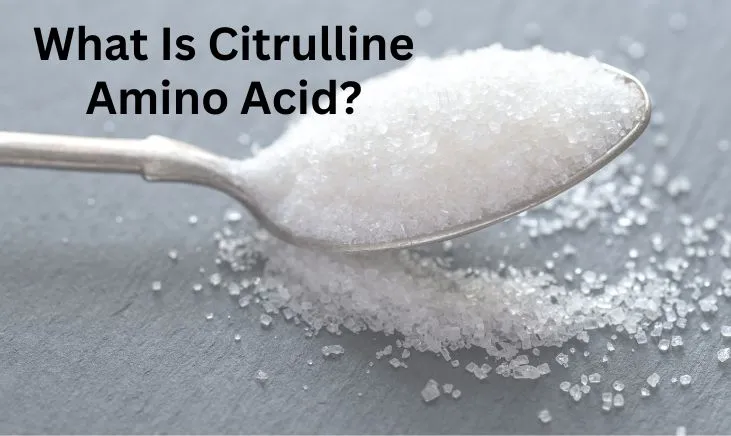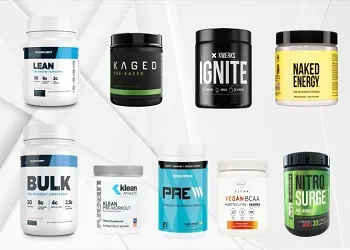L-citrulline is a non-essential amino acid that’s naturally synthesized in the body. It’s a key intermediate of the urea cycle and is produced as a byproduct of nitric oxide (NO) production from the amino acid arginine. It plays a role in regulating vasodilation and, therefore, blood pressure and blood flow. It may also offer benefits for exercise performance and erectile dysfunction (ED).
Quick Look
- L-citrulline is a non-essential, non-protein amino acid naturally synthesized in the body from ornithine and arginine.
- Citrulline is converted to arginine and NO, which regulate vasodilation, blood pressure, and blood flow.
- Research suggests citrulline supplementation may benefit blood pressure, ED, and exercise performance.
- There are two types of citrulline supplements: pure L-citrulline and citrulline malate.
- Recommended citrulline doses range from 3-6 g/day for L-citrulline and 8 g/day for citrulline malate.
Table of Contents
What is L-Citrulline?
L-citrulline is a non-essential amino acid first isolated from watermelon; its name is derived from the Latin word citrullus, meaning watermelon. As a non-protein amino acid, citrulline never gained much attention and was seen solely as an intermediate in the urea cycle (excretion of ammonia). More recently, however, the interest in citrulline has increased considerably.
As a non-essential amino acid, citrulline can be synthesized de novo from other amino acids. In this case, there are three pathways:
- From arginine via nitric oxide synthase, as a byproduct of NO production
- From ornithine via degradation of proline or glutamine/glutamate
- From asymmetric dimethylarginine via DDAH
You can also boost citrulline levels through food—we’ll give you a rundown of the best citrulline-rich foods at the end of this article.
Unlike most amino acids, citrulline isn’t involved in protein synthesis. It’s used primarily in the urea cycle to excrete ammonia from the body, but it’s also required for the production of nitric oxide, a signaling molecule that’s involved in vasodilation, and the release of certain hormones, such as growth hormone and insulin.
How Does Citrulline Work?
Citrulline is a non-protein amino acid that plays several key roles in the body:
- Vasodilation: Increases the width of blood vessels to improve blood flow and reduce arterial pressure via increasing levels of NO.
- NO production: Citrulline is converted to arginine, which serves as a precursor to the formation of nitric oxide, one of the body’s most important signaling molecules involved in regulating vasodilation, blood flow, and muscle oxygenation.
- Hormone release: Studies have shown that citrulline supplementation can increase concentrations of growth hormone (GH) and insulin-like growth factor-1 (IGF-1).

Although citrulline isn’t directly involved in building proteins like most amino acids, some research suggests it may boost muscle protein synthesis via stimulating specific signaling pathways involved in muscle building.
Key takeaway: Citrulline is a non-protein, nonessential amino acid synthesized from ornithine or arginine. It plays a crucial role in NO production, which is involved in vasodilation, blood flow, and muscle oxygenation.
Health Benefits of Citrulline Amino Acid
L-citrulline is naturally synthesized in the body regardless of food consumption or supplementation. However, upon consumption, citrulline is broken down into arginine, which serves as a precursor for NO formation.
As one of the most crucial signaling molecules in the body, NO benefits cardiovascular health and exercise performance and may also offer benefits for erectile dysfunction.
According to a 2024 survey from Everflex Fitness, the majority of respondents who took L-citrulline supplements took them to improve exercise performance and blood flow (figure 1). However, what’s interesting is that, of the people who took citrulline supplementation, most saw an improvement in blood flow and blood pressure, while fewer people saw improvements in endurance or strength performance.

Figure 1: Citrulline supplementation for a specific health condition from Everflex Fitness survey.

Figure 2: Outcomes of citrulline supplementation from Everflex Fitness survey.
So, let’s dive into the health benefits and see what citrulline is all about.
Promotes Vasodilation and May Reduce Blood Pressure
The cardiovascular system relies on a careful balance of hormones and chemicals that dilate and constrict the vascular system to maintain blood pressure and blood flow. However, various factors can constrict vessels, driving blood pressure up and reducing blood flow.
Citrulline acts as a vasodilatory agent to widen the blood vessels, improve blood flow, and reduce high blood pressure. It does this by increasing NO levels in the blood, which serves as a vasodilatory agent via the eNOS/NO/cGMP pathway.
Specifically, L-citrulline is converted to L-arginine, leading to increased blood L-arginine levels; L-arginine is a precursor for eNOS-dependent NO synthesis in vascular endothelial cells, and increasing blood levels of NO induces vasorelaxation in smooth muscle cells.
Although citrulline doesn’t offer as potent effects on vasodilation as arginine and some other NO boosters, some research shows that L-citrulline may lower blood pressure. A 2019 systematic review and meta-analysis found that L-citrulline administration led to a modest but significant reduction in systolic blood pressure of about 4 mmHg compared to the placebo group.
However, citrulline doesn’t appear as effective at boosting NO as arginine. A 2015 study found that 10 grams of citrulline did not increase reactive hyperemic forearm blood flow (RH-FBF) in older or young adults.
Key takeaway: Due to its role in increasing nitric oxide levels, citrulline supplementation may dilate blood vessels to increase blood flow and reduce blood pressure.
May Improve Symptoms of Erectile Dysfunction
Regular use of L-citrulline supplements may benefit men struggling with erectile dysfunction. Although the pathology of ED can be complex, L-citrulline may improve symptoms by promoting dilation of blood vessels and improving blood flow.
A 2011 clinical trial published in Urology set out to test the efficacy and safety of oral L-citrulline in improving erection hardness in men with mild erectile dysfunction. Previous research has shown that L-arginine supplements improve nitric oxide-mediated vasodilation and endothelial function, but oral ingestion of arginine is hampered by extensive presystemic metabolism. However, L-citrulline bypasses presystemic metabolism and is converted to L-arginine, offering a more effective method for improving erectile function.
In this study, 24 men with a mean age of 56.5 ± 9.8 years with mild ED (erection hardness score of 3) were given a placebo for one month and L-citrulline (1.5 g/day) for another month. Researchers recorded their erection hardness score, number of intercourses per month, treatment satisfaction, and adverse effects.
Here are the results:
- Erection hardness score: Increase from 3 (mild ED) to 4 (normal erectile function) in 50% of men taking L-citrulline
- Intercourse: Increased from 1.37 ± 0.93 to 2.3 ± 1.37
- Satisfaction: All men reporting an erection hardness score improvement from 3 to 4 reported being very satisfied

Researchers also found that although not as effective as phosphodiesterase type-5 enzyme inhibitors (PDE5 inhibitors) indicated for men with ED, L-citrulline supplementation is a safe and psychologically well-accepted short-term treatment by patients.
Another small study of 50 men with ED found that L-citrulline combined with other ingredients—including French maritime pine bark, roburins, and L-arginine—improved erectile function over the one-month treatment period.
What’s interesting is that some research suggests that men with ED have lower levels of L-citrulline, suggesting the amino acid plays a role in erectile function. Authors of one study concluded that low L-citrulline and L-arginine levels may increase the risk of ED by reducing NO levels.
Citrulline and Exercise Performance
One of the most common uses of citrulline is improving exercise performance, but research on its efficacy is mixed.
Here’s what we know about the benefits of L-citrulline for endurance and strength exercise.
Endurance Exercise
Most of citrulline’s ergogenic effects on exercise performance are thought to result from its ability to boost NO synthesis and buffer ammonia.
For endurance exercise performance, research is inconsistent.
Here’s what a 2017 review found:
- Citrulline supplementation increases plasma L-arginine, the substrate for endothelial NO synthesis.
- Acute increases in NO and mediated vasodilation are inconsistent and explain the inability of citrulline to improve exercise tolerance.
They also showed that long-term L-citrulline supplementation:

These changes lead to improvements in skeletal muscle oxygenation and performance during endurance activity. The review also found that citrulline’s antihypertensive effect can improve blood pressure in prehypertensive or hypertensive patients, but it does not improve blood pressure in normotensive people—but it may attenuate the blood pressure response to exercise in normotensive people.
However, some research supports the role of citrulline supplementation for endurance. A 2016 study examined the effects of L-citrulline supplementation (2.4g/day) on cycling time trial performance in healthy, trained men. Researchers found it significantly increased plasma L-arginine levels and reduced completion time by 1.5 %. Cyclists also noted improved subjective feelings of muscle fatigue and concentration immediately after exercise with L-citrulline supplementation.
Strength Training
Research tends to support the role of citrulline in strength training performance. Due to its ability to enhance NO, citrulline has been named a potential ergogenic aid for resistance training, high-intensity exercise performance, and muscle recovery.
Some of the potential mechanisms as to how it supports strength training include:
- Enhanced blood flow to active muscles
- Improved ammonia homeostasis
- Increased ATP production via greater availability of malate
- Increased nutrient delivery and/or removal of waste products
A 2010 study published in the Journal of Strength and Conditioning Research looked at the effects of a single dose of citrulline malate (CM) on the performance of flat barbell bench presses as an anaerobic exercise and sought to determine the degree of muscle soreness after exercise. Forty-one men completed two training sessions—8 grams of CM was used in one of two training sessions, and a placebo in the other—and resistance was tested using the repetitions to fatigue test, at 80% of their predetermined 1RM in 8 sets of flat barbell bench presses.
Here’s what researchers found:

- 52.92% more repetitions performed using CM
- 40% decrease in muscle soreness at 24 hours and 48 hours after training
Researchers concluded that CM supplementation may improve athletic performance during high-intensity anaerobic exercise with short rest periods and reduce postexercise muscle soreness.
Another study published in the Journal of Strength and Conditioning Research looked at the effects of citrulline malate supplementation on exercise performance, blood lactate, heart rate, and blood pressure during lower-body dynamic resistance exercise. Twelve advanced resistance-trained men were given 8 grams of CM or a placebo. They performed repeated bouts of multiple lower-body resistance exercises—5 sequential sets (60% 1RM) to failure on the leg press, hack squat, and leg extension machines.
All subjects experienced a decrease in repetitions over the bouts of exercise.
Here are the results:
- Subjects taking CM performed significantly more reps in all three exercises.
- Blood lactate and heart rate were higher after exercise but not significantly different between CM and placebo groups.
- No differences in blood pressure.
Researchers concluded that CM supplementation may improve exercise performance during lower-body multiple-bout resistance exercise in advanced resistance-trained men.
Key takeaway: Studies tend to find positive outcomes for CM supplementation on strength exercises to improve work capacity and reduce muscle soreness.
Food With Citrulline
As a non-essential amino acid, citrulline is produced in the body—but you can also find it in several foods.
- Watermelon
- Pumpkins
- Cantaloupe
- Cucumber
- Bitter melon
- Gourds
Types of L-Citrulline Supplements
There are two major forms of citrulline found in dietary supplements:
- L-citrulline: Pure citrulline
- Citrulline malate: Citrulline attached to malate, a compound that’s important for energy production
Both L-citrulline and citrulline malate offer similar benefits and effects; citrulline malate tends to be more popular, especially when it comes to exercise performance.
Citrulline Supplement Dosing
Most research recommends a dose between 3 and 6 grams per day of pure L-citrulline or around 8 grams per day of citrulline malate; CM dosing tends to be higher due to malate.
Here are some dosing recommendations for specific uses:
- Strength training: 8 g/day (provides about 4.5 g of L-citrulline)
- Muscle oxygenation: At least 6 g/day of L-citrulline for 7 days
- Blood pressure: The average dose is between 3 and 6 g/day
Some research shows that higher doses of citrulline (>10 g/day) don’t typically cause gastrointestinal issues like other amino acids do, possibly due to differences in absorption.
Key takeaway: Pure L-citrulline supplementation dose ranges from 3 to 6 g/day depending on the condition, whereas about 8 g/day of citrulline malate appears effective for exercise performance.
Citrulline Supplement Safety and Side Effects
There’s some research available on the safety of citrulline supplements at high doses:
One small study looked at different doses of L-citrulline in eight healthy men. Each participant consumed doses of 2, 5, 10, and 15 grams of citrulline at separate visits, and even at high doses, participants reported no adverse effects.
However, higher doses of citrulline don’t necessarily increase blood arginine levels as you may expect, suggesting there is an upper limit to its efficacy.
In general, over 10 g/day of citrulline doesn’t appear to offer additional benefits.
It’s also important to note that while citrulline amino acid side effects at high doses aren’t common, some people do experience adverse effects, even at lower doses. These include:

It’s also important to remember that amino acid supplements aren’t safe and advised for everyone. L-citrulline supplements may interact with some medications, including:
- Antihypertensives
- Nitrates
- Phosphodiesterase-5 Inhibitors (ED medications)
If you’re considering taking an L-citrulline supplement but are currently taking prescription medications, be sure to consult with your healthcare professional before starting.
What does the amino acid L-citrulline do?
Citrulline is a non-protein amino acid that is a key intermediate of the urea cycle and is produced as a byproduct of nitric oxide (NO) production from the amino acid arginine. It’s often used to boost nitric oxide levels, which is essential for regulating vasodilation, blood pressure, and blood flow. Its ability to boost NO may also benefit exercise performance and ED.
Is it safe to take L-citrulline every day?
Most experts agree that L-citrulline is safe for daily consumption in doses ranging from 3 to 6 grams of pure L-citrulline. If taking citrulline malate, the recommended dose is 8 grams per day.
Which foods have citrulline amino acids?
Citrulline is widely available in supplements, but the highest natural concentrations are found in watermelon. You can also find citrulline in cantaloupe, bitter melons, squashes, gourds, cucumbers, and pumpkins.
Does citrulline increase testosterone?
Few studies support the notion that citrulline can increase testosterone levels, but some research suggests that it may help increase testosterone levels indirectly by increasing NO levels.














